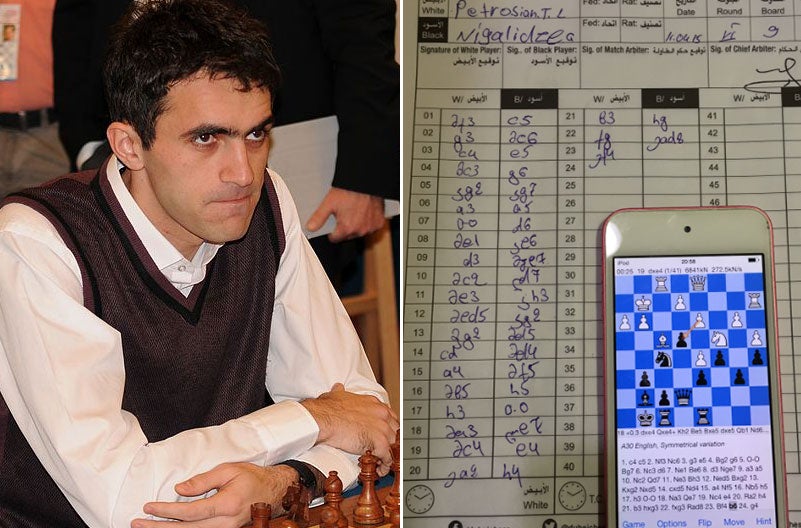Georgian chess Grandmaster Gaioz Nigalidze caught cheating after hiding smartphone in tournament toilet
Nigalidze aroused suspicion after making repeated trips to the toilet during his matches

Your support helps us to tell the story
From reproductive rights to climate change to Big Tech, The Independent is on the ground when the story is developing. Whether it's investigating the financials of Elon Musk's pro-Trump PAC or producing our latest documentary, 'The A Word', which shines a light on the American women fighting for reproductive rights, we know how important it is to parse out the facts from the messaging.
At such a critical moment in US history, we need reporters on the ground. Your donation allows us to keep sending journalists to speak to both sides of the story.
The Independent is trusted by Americans across the entire political spectrum. And unlike many other quality news outlets, we choose not to lock Americans out of our reporting and analysis with paywalls. We believe quality journalism should be available to everyone, paid for by those who can afford it.
Your support makes all the difference.Georgian chess Grandmaster Gaioz Nigalidze faces a 15 year ban from the game after being caught cheating at the Dubai Open Chess Tournament, where he had been using a smart phone to analyse one of his matches, which he had kept hidden in a toilet.
Nigalidze’s cheating had been discovered by officials during his sixth round with Armenia’s Grandmaster Tigran Petrosian.
Petrosian had told the tournament’s staff he believed Nigalidze was getting help from a chess computer through a portable electronic device during the game. He said he began to suspect his opponent after noticing he was frequenting the toilet after each move during a crucial part of the game.
Speaking to The Telegraph, Petrosian said: “I noticed he would always visit the same toilet partition, which was strange, since two other partitions weren’t occupied.”
Players are not allowed to carry mobile phones or other electronic devices with them during games sanctioned by the International Chess Foundation.
After an initial search of Nigalidze, which proved fruitless, the tournament’s chief arbiter checked the cubicle the Georgian player had kept using, and found a smart phone and headset hidden behind the pan and covered in toilet paper.

Nigalidze, a back-to-back winner of the Georgian Chess Championship in 2013 and 2014, denied the phone was his, but he was found out when it was discovered the device was hooked up to a social networking site using the champion’s account, and that his game with Petrosian was being analysed in one of the chess applications.
The champion has been banned from the Dubai Open and could be banned from competing altogether for 15 years.
While cheating at the highest level of chess is uncommon, it is not unheard of. Two years ago Borislav Ivanov, dubbed “the James Bond of chess,” was ejected from a tournament in Spain after players claimed he had used devices hidden in his shirt and shoes to aid his game.
In 2011, three senior French chess players were found to be “cheating by text message”. The players denied the charges but were accused of using an elaborate web of text messages and movements around the competition hall to communicate information from a computer programme while matches were in progress.
Join our commenting forum
Join thought-provoking conversations, follow other Independent readers and see their replies
Comments